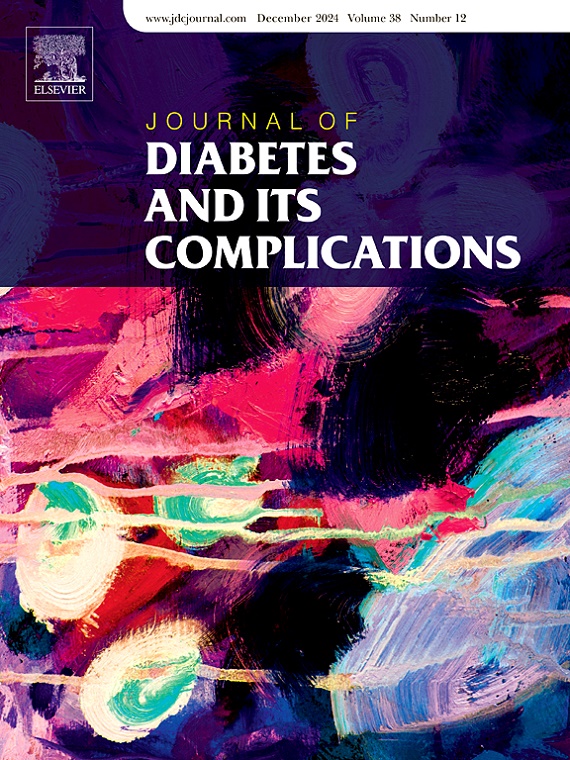更好的睡眠:加拿大成人1型糖尿病患者的睡眠质量
IF 3.1
3区 医学
Q3 ENDOCRINOLOGY & METABOLISM
引用次数: 0
摘要
目的探讨1型糖尿病(PwT1D)患者睡眠质量差的相关因素。方法数据从BETTER Registry中提取。使用匹兹堡睡眠质量指数(PSQI)测量睡眠质量。社会人口特征(年龄、生理性别、教育程度、收入、种族、体重指数);糖尿病相关(糖尿病病程、血糖监测方法、治疗类型、低血糖认知);心理(对低血糖的恐惧、糖尿病相关的痛苦和耻辱、抑郁、社会支持);和行为变量(睡前吃零食、咖啡因、酒精和大麻使用、中高强度体育活动[MVPA])在多变量logistic回归分析中测试了它们与睡眠质量差的关系(PSQI >5)。结果PwT1D患者共1322例,平均年龄45.0±15.0岁;66.9%女性)有睡眠数据。平均PSQI评分为6.0±3.4分,睡眠质量差的占47.3%。女性(OR = 1.422;95% CI: 1.080-1.873),超重/肥胖(OR = 1.376;95% CI: 1.067-1.775),对低血糖的更大恐惧(OR = 1.016;95% CI: 1.008-1.023),患有中度至重度抑郁症(OR = 6.160;95% CI: 4.250-8.929),总是在睡前吃零食(OR = 1.706;95% CI: 1.124-2.590),使用大麻(OR = 1.578;95% CI: 1.152-2.161),累积150分钟/周的MVPA (OR = 1.563;95% CI: 1.107-2.203)与睡眠质量差相关。结论许多PwT1D患者睡眠质量较差,其睡眠与多种社会人口学、心理和行为因素有关。本文章由计算机程序翻译,如有差异,请以英文原文为准。
BETTER sleep: Sleep quality among adults living with type 1 diabetes in Canada
Aims
Identify correlates of poor sleep quality among people living with type 1 diabetes (PwT1D).
Methods
Data were extracted from the BETTER Registry. Sleep quality was measured using the Pittsburgh Sleep Quality Index (PSQI). Sociodemographic characteristics (age, biological sex, education, income, ethnicity, body mass index); diabetes-related (diabetes duration, glucose monitoring method, treatment type, hypoglycemia awareness); psychological (fear of hypoglycemia, diabetes-related distress and stigma, depression, social support); and behavioral (snacking before bedtime, caffeine, alcohol and cannabis use, moderate-to-vigorous physical activity [MVPA]) variables were tested in multivariate logistic regression analyses for their association with poor sleep quality (PSQI >5).
Results
A total of 1322 PwT1D (mean age: 45.0 ± 15.0 years; 66.9 % female) had sleep data. The mean PSQI score was 6.0 ± 3.4 and 47.3 % had poor sleep quality. Being female (OR = 1.422; 95 % CI: 1.080–1.873), with overweight/obesity (OR = 1.376; 95 % CI: 1.067–1.775), greater fear of hypoglycemia (OR = 1.016; 95 % CI: 1.008–1.023), having moderate-to-severe depression (OR = 6.160; 95 % CI: 4.250–8.929), always snacking before bedtime (OR = 1.706; 95 % CI: 1.124–2.590), using cannabis (OR = 1.578; 95 % CI: 1.152–2.161), and accumulating <150 min/week of MVPA (OR = 1.563; 95 % CI: 1.107–2.203) were correlates of poor sleep quality.
Conclusions
Many PwT1D have poor sleep quality, and their sleep is associated with various sociodemographic, psychological, and behavioral factors.
求助全文
通过发布文献求助,成功后即可免费获取论文全文。
去求助
来源期刊

Journal of diabetes and its complications
医学-内分泌学与代谢
CiteScore
5.90
自引率
3.30%
发文量
153
审稿时长
16 days
期刊介绍:
Journal of Diabetes and Its Complications (JDC) is a journal for health care practitioners and researchers, that publishes original research about the pathogenesis, diagnosis and management of diabetes mellitus and its complications. JDC also publishes articles on physiological and molecular aspects of glucose homeostasis.
The primary purpose of JDC is to act as a source of information usable by diabetes practitioners and researchers to increase their knowledge about mechanisms of diabetes and complications development, and promote better management of people with diabetes who are at risk for those complications.
Manuscripts submitted to JDC can report any aspect of basic, translational or clinical research as well as epidemiology. Topics can range broadly from early prediabetes to late-stage complicated diabetes. Topics relevant to basic/translational reports include pancreatic islet dysfunction and insulin resistance, altered adipose tissue function in diabetes, altered neuronal control of glucose homeostasis and mechanisms of drug action. Topics relevant to diabetic complications include diabetic retinopathy, neuropathy and nephropathy; peripheral vascular disease and coronary heart disease; gastrointestinal disorders, renal failure and impotence; and hypertension and hyperlipidemia.
 求助内容:
求助内容: 应助结果提醒方式:
应助结果提醒方式:


